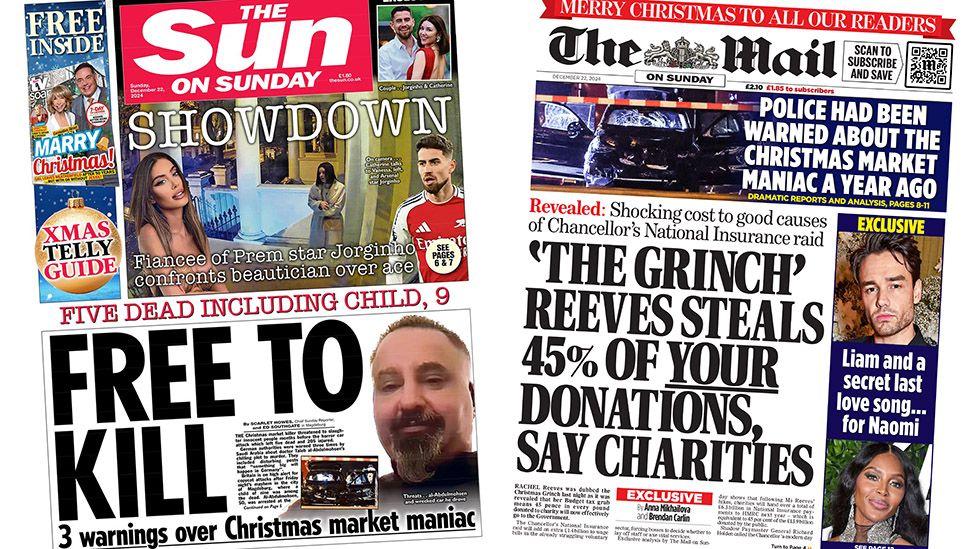Recent headlines in major UK newspapers bring attention to significant stories, particularly the tragic car attack in Magdeburg, Germany. Reports from various outlets indicate a concerning oversight by law enforcement, as the suspected driver had previously signaled intentions of a violent act via social media. The Sunday People prominently features floral tributes in the city, underscoring public mourning. Meanwhile, The Sunday Times highlights multiple prior warnings from Saudi Arabia about this “market killer,” raising questions about potential missed opportunities to prevent such violence. The attack has sparked a broader discourse around public safety and the effectiveness of police response in critical situations.
The political sphere is also in focus as the Observer reveals tensions related to financial contributions from foreign parties, specifically Elon Musk’s potential funding for Nigel Farage’s Reform UK party. Despite demands from various factions to curtail foreign donations to political entities in the UK, there is palpable hesitance from government officials, who fear that rapid interventions could be portrayed as attempts to undermine Farage’s party. This complex situation brings to light the ongoing debate about the influence of external money in British politics, with voices like Rod Liddle of The Sunday Times critiquing calls for stricter regulations as inhibiting healthy political competition.
Economic concerns surface prominently in The Sunday Telegraph, reporting on a proposed “grocery tax” designed to promote net zero targets. This packaging levy could burden households with increased shopping costs, potentially raising annual expenditures by about £56 per family. The government’s aim is to combat excessive waste, although critics question whether this initiative might disproportionately impact consumers already facing economic strain. The discussion around this grocery tax reflects broader anxieties surrounding inflation and living costs in the UK, emphasizing the delicate balance between environmental initiatives and economic realities for families.
On a related note, the Mail on Sunday highlights implications of recent tax increases on charitable giving, suggesting that an alarming 45% of donations may now be diverted to government coffers. Labeling Chancellor Rachel Reeves as a modern-day “Grinch,” they echo concerns about how tax hikes could disincentivize charitable contributions at a time when nonprofits face increasing demands. Although the Treasury defends the current tax regime for charities as among the most generous, the perception of government overreach in private philanthropy raises significant ethical questions about the role of taxation in social welfare.
The state of the UK’s national security is grimly addressed in the Sunday Express, which claims budget constraints have rendered the Royal Navy unable to deploy both of its aircraft carriers in the event of a military threat. The article emphasizes that one carrier, the Queen Elizabeth, could remain docked due to crew shortages and resource cuts, underscoring a broader narrative about defense capabilities amid changing geopolitical landscapes. This revelation has serious implications for national defense policy and raises alarms about the military’s readiness to respond to potential crises.
Finally, the Sunday papers turn a spotlight on the pressures facing the National Health Service (NHS), as Health Secretary Wes Streeting shares firsthand accounts from emergency departments. Expressing both pride in NHS staff and embarrassment over the treatment conditions witnessed, he affirmed that while the healthcare system is “broken,” it is not beyond repair. The discussion of NHS challenges continues in the context of ongoing budgetary constraints and public expectations for healthcare quality. Additionally, the Sunday Telegraph reports playful royal metrics, noting that King Charles has taken on a notably high number of public engagements this year, reflecting his commitment amid personal health struggles. These stories illustrate a week in UK media that captures a blend of tragedy, political maneuvering, economic debate, national defense concerns, and the human elements of governance.

